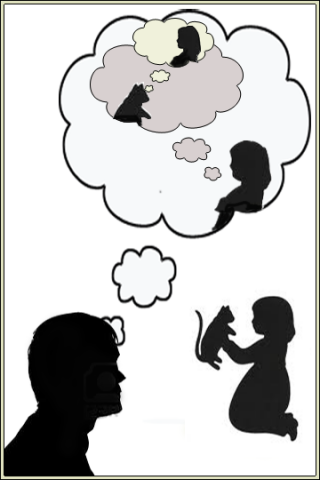Autism
Guide to Reporting on Autism: Theory of Mind & Empathy
Autism is the proverbial minefield. Let's attempt some mine clearance.
Posted March 20, 2013

He's thinking she's thinking the cat's thinking about her.
Autism coverage in the mainstream and academic media is a common trigger for autistic people and their allies. The science, politics, and lived experience of autism is so complex and nuanced it demands specialty reporting — but when media organizations can barely run to a foreign correspondent, they’re not investing in autism experts either. I'm not an autism expert, but Psychology Today gave me a blog — so here goes.
Theory of Mind (ToM) and empathy
My backstory When my son was diagnosed with Asperger's (autistic), and I read that autism involves empathy deficits, I figured my empathic kid must be an exception to the rule. Then I met another couple of autistic kids, observed their behavior, and concluded they were exceptions too. Then I made some autistic, compassionate friends and— you get the idea. So then I had to consider that there was something wrong with the model.
What's the model? What is ToM? ToM is a social cognitive skill. It’s the ability to understand that other people have attitudes, beliefs, feelings, experiences and intentions that are different from one’s own. It is often described as empathy. The absence of ToM is sometimes called mindblindness.
Why is it relevant to autism? In 1985, Simon Baron-Cohen and two other UK researchers published a study appearing to show that autistic children lacked the ability to take other people’s perspective. Since then, other studies (by Baron-Cohen and/or his accolytes, for the most part) have appeared to confirm those findings. Consequently, the notion that “ToM deficits” are a defining characteristic of autism has become embedded in medical and mainstream lore. There’s a widespread belief that autistic people, essentially, lack empathy.
Why is it not relevant to autism? The ToM theory (ToMT) is... a theory. For evidence and arguments against it, helpfully assembled for one-stop shoppers by autistic self-advocate Rachel Cohen-Rottenberg, see the site Autism and Empathy. Many autistic people and their families find the ToMT contradicted and qualified by their own and others’ experience. A range of studies backs them up. Some of the strongest evidence comes from researchers who understand language issues and the ways those can influence ToM experiments, as Rachel Cohen-Rottenberg pointed out to me.
Are ToM and empathy the same thing? It's a troublesome area, since empathy, in particular, is inconsistently defined. A model that is likely simplistic distinguishes between cognitive empathy, the ability to read other people's feelings, and affective empathy, the ability to share other people's feelings. (Psychopaths know how miserable they make us. They just don’t care. That’s cognitive empathy, but not affective empathy.) Simon Baron-Cohen (sorry to keep mentioning him, but) equates ToM with cognitive empathy. Let’s just say that ToM and empathy seem closely related and are often conflated.
How does ToMT influence autism coverage? Much mainstream reporting alludes to the ToMT as an explanation for difficulties and behaviors that are ascribed (often wrongly) to autism. Early coverage of the Newtown shootings, for example, dwelled on reports (not confirmed) that the shooter had been diagnosed with Asperger syndrome and implied that this helped explain his actions. Five months earlier, Joe Scarborough, MSNBC host, speculated that the Aurora shooter was autistic, again without evidence of either the shooter’s neurology or any relevance of that neurology to the crime.
Why does it matter? Because it implies that autistic people are cold, dangerous, even sub-human. (Ironically, this verdict epitomizes the absence of empathy.) The message is pervasive, even reaching young children. It’s an obstacle to mutual understanding and growth: call it a societal pervasive developmental disorder. Autistic people are already vulnerable to discrimination and abuse, including bullying and exclusion from school, being denied employment opportunities, and hate speech. After the Newtown shooting, a Facebook account was created that called for the murders of autistic people. Autistic people and their allies were forced onto the defensive and had to demonstrate repeatedly that there is no link between autism and planned violence.
Who’s right on ToM? I side with the self-advocates, for a bunch of reasons.
- Looking to non-autistic people to say what it’s like to be autistic is like asking white people what it’s like to be black.
- ToM and empathy are multi-faceted qualities that manifest in different ways. Many autistic people acknowledge they have trouble reading other people in the moment (cognitive empathy). That doesn’t reduce their ability (as research shows) to share others’ pain and feel compassion (affective empathy). Actually, many autistic people report an overload of affective empathy, such that they have to back away in order to handle it (a response that can be interpreted as uncaring). [Scroll down for descriptions from autistic people.]
- It seems likely that that apparent differences in ToM actually represent other issues: differences in language and communication, sensory processing, and unconventional responses to their own and others' emotional experiences. Michael Wilcox, my autistic friend and fellow blogger, argues that empathy is more meaningfully understood not as cognitive and affective, but as receptive and expressive. It's in the expression, he points out, that the confusion arises. Which is to say, autistic people’s behavior doesn’t match non-autistic people’s behavior, and non-autistic behavior is assumed to be the gold standard, so.
Are you saying every autistic person is empathic? No. But I say that with confidence only because plenty of non-autistic people aren’t empathic. (Look at the world. I rest my case.) This doesn’t mean lack of empathy is a defining characterictic of either group.
Empathic? Or empathetic? I think empathic, but no one seems to agree with me anymore.
What’s a safe way to cover this?
- Don’t suggest that the behavior of autistic people has anything to do with supposed deficits in ToM or empathy.
- If you must refer to the ToMT, be clear that it’s hypothetical and contentious.
- And quote autistic people on the issue:
— The Autistic Self Advocacy Network is well supplied with spokespeople
— Rachel Cohen-Rottenberg can be contacted via her Autism and Empathy Facebook page
— Check out the quotations below and follow the links to additional sources.
Note on the graphic So it's not such a victory for the guy to sense that the kid is thinking about the cat. Facebook has shown us that 75% of people are thinking about cats 75% of the time. But I hope it captures the general idea.
Autistic people talking about ToM
“I tend to have trouble reading emotional signals. I can often get a vague interpretation someone's feelings, but I never have any idea what to do about it. When I get it wrong, either in interpretation or response, I get very anxious, and anxiety makes the whole thing worse.” Brigianna Spencer, GA (by Facebook chat, March 2013)
“I am sort of BLIND when it comes to body language meaning when I see someone upset , I look at the face, but if I also concentrate on the body language I get confused because I am MULTI-TASKING my senses.” D.L., MA (by email, March 2013)
“It can be common for people on the spectrum to be oversensitive, to the point where emotions need to be habitually suppressed in order to simply cope and when these emotions do escape — the mental and emotional feedback can be incredibly painful and even psychologically damaging.” ZenEmu (blog post, 2011)
"I think most of the research into social skills is screwy. The reason? It all assumes you’re interacting with a neurotypical (NT) person. Therefore, ‘good social skills’ refers to good understanding of NTs, while ‘poor social skills’ refers to poor understanding of NTs. Imagine if we defined ‘good language skills’ as ‘speaking English well’." Ettina (blog post, 2012)
“I absolutely understand that other people have their own plans, thoughts, and points of view — but those plans, thoughts and points of view are often a mystery to me... ‘Putting myself in someone else’s shoes’ would have me doing something very different that what another person might envisage doing in a similar situation.” Lynne Soraya (PT blog, 2008)
"Most people have plenty of empathy, but only for people like themselves." Charlie Devnet, autistic self-advocate (blog post, 2012)
“This is the biggest complaint in my couples support groups: the Asperger's partner does not express empathy. To [non-autistic spouses], it's not empathy if it isn't expressed... Without that piece, it does not serve its purpose. The terms I have used here, receptive and expressive, are often used to describe forms of communication. And that's really what empathy is, in its fullest expression; communicating emotional states. Autistics are really good (relatively speaking) at receptive empathy, but often fail at expressive empathy.” Michael Wilcox, autistic self-advocate and counsellor of neurologically mixed couples (email, March 2013)
"Do people like Joe Scarborough know what it means to be that stigmatized? Do they have any idea of the fear it engenders in people? Do they have any idea of how it tears at the heart?" Rachel Cohen-Rottenberg, autistic self-advocate (blog post, 2012)




